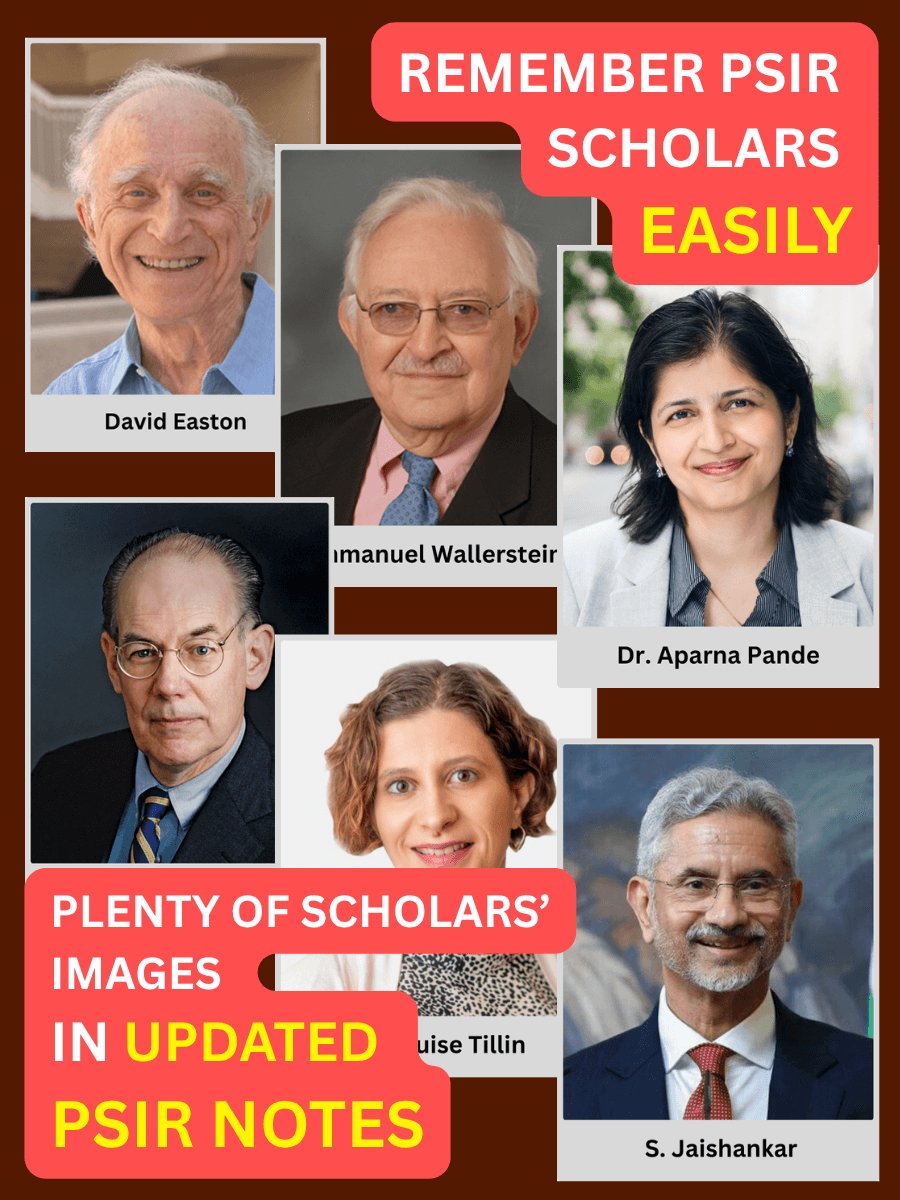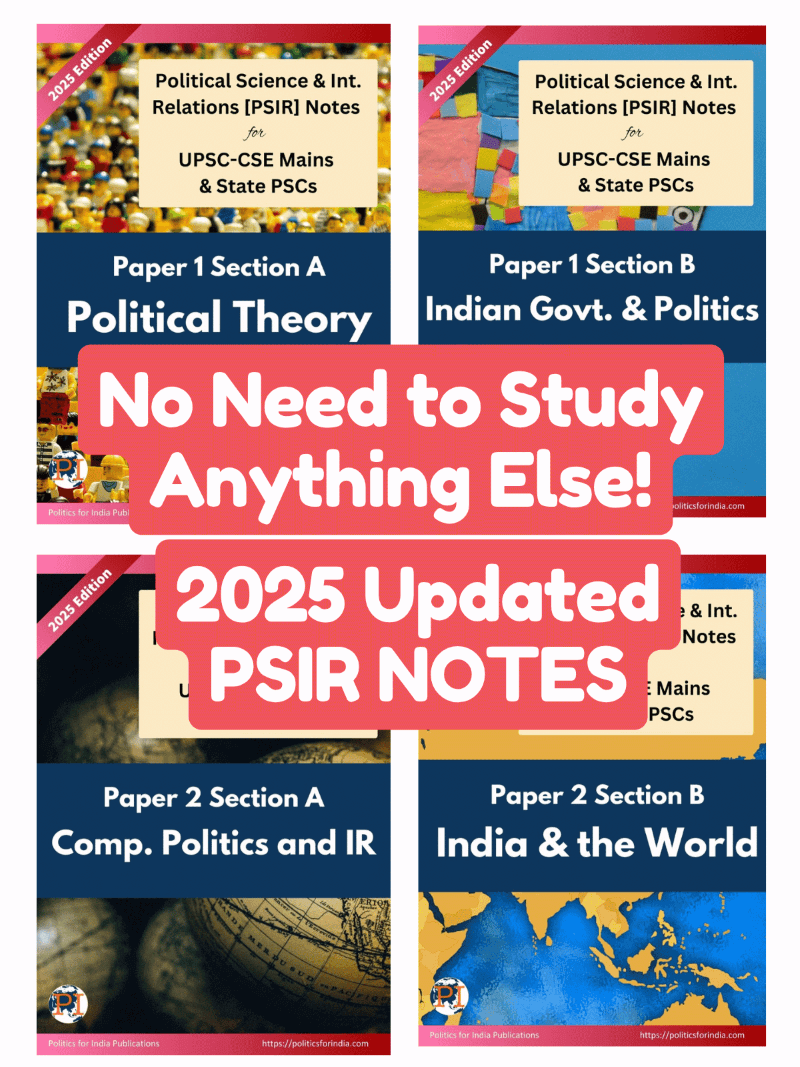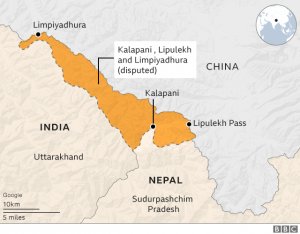
2024 PSIR Optional Question Paper
PSIR Optional 2024 – Paper 1
SECTION A: POLITICAL THEORY
Q1. Write approximately 150 words on each one of the following:
(a) Behavioural approach to Political Science (10m)
(b) Pluralist theory of State (10m)
(c) Locke’s views on Revolution (10m)
(d) Decline of Liberalism (10m)
(e) Linkage between Power and Hegemony (10m)
Q2.
(a) Elucidate the meanings inherent in the term ‘political’ with appropriate illustrations. (20m)
(b) Marxism is a political theory of action demanding strict compliance with its core principles. Comment. (15m)
(c) The nature of relationship between equality of democratic citizenship and liberty of citizens is influenced by economic equality. Comment. (15m)
Q3.
(a) The debate on human rights is caught between the limitations of both universalism and cultural relativism. Comment. (20m)
(b) Deliberative democracy seeks to promote democratic decision making about public issues among the citizens. Discuss. (15m)
(c) Dharmashastra presents a duty-centric worldview for individuals and communities. Comment. (15m)
Q4.
(a) Legitimacy adds positive value to political authority and obligation. Discuss. (20m)
(b) Critically examine Plato’s theory of Forms. (15m)
(c) Manabendra Nath Roy’s political thought highlighted the humanistic aspects of Marxism. Discuss. (15m)
SECTION B: INDIAN GOVERNMENT AND POLITICS
Q5. Write approximately 150 words on each one of the following
(a) Constitutional morality in the Indian Constitution (10m)
(b) Objective Resolution of the Constituent Assembly (10m) (10m)
(c) Legal remedies in Part III of the Constitution of India (10m)
(d) Relevance of the Legislative Council (10m)
(e) Women’s role in anti-arrack movement (10m)
Q6.
(a) How far do you agree that the Directive Principles of State Policy are more fundamental than the Fundamental Rights in meeting socio-economic justice as mentioned in the Preamble of the Constitution? (20m)
(b) Explain the structure and functions of the National Commission for Women. (15m)
(c) The legacy of the Planning Commission still has a bearing on India’s development policies. Discuss. (15m)
Q7.
(a) Discuss the contribution of the Dalit struggle to establish egalitarianism in Indian society during freedom movement. (20m)
(b) The blueprint of Gram Swaraj is the key to understand the Gandhian perspective on planning. Discuss. (15m)
(c) Critically assess the role of pressure groups in the decision-making process of the government. (15m)
Q8.
(a) Discuss the role of environmental movements in shaping the environmental governance in India. (20m)
(b) “Relative deprivation is a major source of ethnic conflict.” Elaborate the statement with relevant examples. (15m)
(c) Gram Sabha in the Panchayati Raj system is a forum which gives expression to the collective wisdom, aspirations and the will of the people. Comment. (15m).
PSIR Optional 2024 – Paper 2
SECTION A: COMPARATIVE POLITICS AND INTERNATIONAL RELATIONS
Q1. Answer the following questions in about 150 words each.
(a) Discuss the interpretive approach to the study of comparative politics. (10m)
(b) Explain the central tenets of the World-Systems Theory. (10m)
(c) The expansionist tendencies of the current Russian regime indicate its intentions for the realisation of a Greater Russia on the lines of the Soviet era. Comment. (10m)
(d) Explain the various facets of the idealist approach to the study of international relations. Comment on its contemporary relevance. (10m)
(e) The changing global order and ongoing regional conflicts, with the global powers taking sides, have jeopardised the progress made towards disarmament in the past. Comment. (10m)
Q2.
(a)”Deglobalisation is displacing globalisation.” Comment. (20m)
(b)What are the distinctive features of the post-modern state in the advanced capitalist economies? Analyse. (15m)
(c)What were the limitations of NAFTA? How did its replacement by the United States-Mexico-Canada Agreement counter them? Explain. (15m)
Q3.
(a)Discuss the major recent social movements related to the physical rights of women in various countries of the world. (20m)
(b)Critically examine the role of political parties in sustaining and stabilising democracies in the developing societies. (15m)
(c)Do you agree with the view that the USA uses NATO as a traditional tool of strategy to perpetuate its hegemony in the world? (15m)
Q4.
(a) ‘The Gramscian theory of hegemony provides many valuable insights into the nature of global power.” Comment. (20m)
(b) The return of trade barriers and economic sanctions has diminished the spirit of GATT. In this context, discuss the factors contributing to the decline of WTO in recent times. (15m)
(c) Do you agree with the view that the EU has thus far proved to be the most successful experiment in the regional integration processes? Account for its successes and also some of the recent challenges that it is faced with. (15m)
SECTION B: INDIA AND THE WORLD
Q5. Answer the following questions in about 150 words each:
(a) “India must strive to become a semi-permanent member of the UNSC, rather than a permanent member without the right to veto.” Comment. (10m)
(b) Bhutan has historically been an ally of India, but the China-Bhutan border related issues have become a security issue for India. Discuss. (10m)
(c) “Nothing is going to move within the WTO negotiations unless India is on board.” Discuss the main reasons behind India’s increased clout in the WTO. (10m)
(d) Discuss the rationale behind replacing the “Asia-Pacific” strategy with the new term “Indo-Pacific” strategy. (10m)
(e) Despite deep ties, India’s relations with Sri Lanka have seen strains due to China’s growing influence in Sri Lanka through investments and economic dominance. Analyse. (10m)
Q6.
(a) Would you concur with the view that of late, India’s foreign policy has been in a transition mode from Nehruvianism to Neoliberalism? Support your answer with the help of suitable examples. (20m)
(b) Does the idea of the 21st century as ‘Asian century’ continue to remain feasible given the growing friction between India and China? (15m)
(c) Discuss the potential role that India could play as the leader of the Global South in realising the goal of establishing a new international economic order in the 21st century. (15m)
Q7.
(a) Discuss the future of SAARC in the light of India’s increased focus on other regional groupings like ASEAN and BIMSTEC. (20m)
(b) Critically examine India’s persistent refusal to sign the nuclear non-proliferation treaty (NPT) despite being recognized as a de-facto nuclear power. (15m)
(c) “India and USA have become such strong strategic partners that they need not become formal allies.” Comment. (15m)
Q8.
(a) Critically examine the continuity and change in India’s Palestine policy in the wake of the ongoing Israel-Hamas War. (20m)
(b) Discuss the implications of the scrapping of the Free Movement Regime with Myanmar by the Indian Government on the complex ethno-political dynamics of the north-eastern region. (15m)
(c) “India has of late, chosen to debunk non-alignment in its pursuit of multi-alignment.” Comment. (15m)
Analysis in Numbers
PYQ Based Analysis
| Section | 1A | 1B | 2A | 2B | Total |
|---|---|---|---|---|---|
| Questions directly asked before | 2 | 10 | 6 | 5 | 23 (41%) |
| Questions based on PYQs | 5 | 0 | 1 | 4 | 10 (18%) |
| Questions on relatively new concept | 7 | 4 | 7 | 5 | 23 (41%) |
| Total Questions | 14 | 14 | 14 | 14 | 56 |
Syllabus/Current Affairs Based Analysis
| Section | 1A | 1B | 2A | 2B | Total |
|---|---|---|---|---|---|
| Questions from the static part of syllabus given by UPSC | 14 | 11 | 7 | 9 | 41 (73%) |
| Questions based on recent happenings (up to last 10 years) and part of Syllabus | 0 | 2 | 6 | 5 | 13 (23%) |
| Questions strictly from current affairs (last 1 year) | 0 | 0 | 0 | 0 | 0 (0%) |
| Out of syllabus / unexpected question | 0 | 1 | 1 | 0 | 2 (4%) |
| Total Questions | 14 | 14 | 14 | 14 | 56 |
Commentary on Above PSIR Optional 2024 Analysis
From above analysis, it appears that they’ve increased the question from relatively new topics (topics which have not been asked before). This year, they asked 23 such questions compared to 14 last year. (Click here for 2023 PSIR Optional Analysis) However, if you refer to the second table, you will also realize that ‘out of syllabus / unexpected questions were only two (anti-arrack movement and interpretive approach to Comp. Politics).
Thus, we would suggest doing UPSC Syllabus very thoroughly. You should also do PYQs but don’t expect that they will ask same questions.
Regarding current affairs, most of the notes / classes cover events from last 10 years in India and in international relations. UPSC questions are mainly focused around that only. The questions from a specific current happening are relatively rare. However, it also doesn’t mean that you should not to current affairs for PSIR. Knowledge of current affairs does add value to your answers and should be used accordingly. However, completing the static syllabus should be always given a priority.
Commentary on Individual Questions and Topic-wise Classification
PSIR Optional 2024 Section 1A Topic-wise Questions
Topic 1: Introduction to Political Theory
1(a) Behavioural approach to Political Science (10m) [Often asked question directly or indirectly in PYQs – 2021, 2019, 2011]
2(a) Elucidate the meanings inherent in the term ‘political’ with appropriate illustrations. (20m) [Not a PYQ based question. However deals with basics of PSIR]
Topic 2: Theories of State
1(b) Pluralist theory of State (10m) [Asked in 2019]
Topic 3: Justice
[Surprisingly, no question on Justice this year. Since 2013, there always have been a question or two from this topic.]
Topic 4: Equality
2(c) The nature of relationship between equality of democratic citizenship and liberty of citizens is influenced by economic equality. Comment. (15m) [Very specific question, not asked before. However, the relation between equality and liberty has been asked before in 2014]
Topic 5: Rights
3(a) The debate on human rights is caught between the limitations of both universalism and cultural relativism. Comment. (20m) [Not asked before. But indirectly, they’ve asked challenges to human rights as well as multicultural perspectives of rights before as well. 2023, 2022, 2021, 2017 etc.]
Topic 6: Democracy
3(b) Deliberative democracy seeks to promote democratic decision making about public issues among the citizens. Discuss. (15m) [They’ve asked about deliberative democracy multiples times before – 2021, 2019, 2017, 2015. And although the question is being very specific, if someone has done the topic well, he/she should be able to manage well.]
Topic 7: Power
1(e) Linkage between Power and Hegemony (10m) [Relation between legitimacy and hegemony was asked in 2012. Concept of power have been asked numerous times and hegemony is one of the bases of power. The linkage between Power and Hegemony have been asked for the first time.]
4(a) Legitimacy adds positive value to political authority and obligation. Discuss. (20m) [The relation between legitimacy and authority have been asked before – 2018. Separately legitimacy have also been asked multiple times. However, the concept of political obligation have been asked for the first time.]
Topic 8: Ideologies
1(d) Decline of Liberalism (10m) [There was simlar question in 2022 asking about weakening hegemony of neoliberalism. While this question is not exactly same, doing 2022 question would have helped a lot.]
2(b) Marxism is a political theory of action demanding strict compliance with its core principles. Comment. (15m) [Not asked before, but deals with basics of Marxism.]
Topic 9: Indian Political Thought
3(c) Dharmashastra presents a duty-centric worldview for individuals and communities. Comment. (15m) [Not asked before directly. Question about Dharma asked in 2013 ]
4(c) Manabendra Nath Roy’s political thought highlighted the humanistic aspects of Marxism. Discuss. (15m) [They didn’t asked question on this topic since 2012. A surprise for everyone. But not a out of syllabus question.]
Topic 10: Western Political Thought
1(c) Locke’s views on Revolution (10m) [Not asked before]
4(b) Critically examine Plato’s theory of Forms. (15m) [Not asked before]
PSIR Optional 2024 Section 1B Topic-wise Questions
Topic 1: Indian Nationalism
7(a) Discuss the contribution of the Dalit struggle to establish egalitarianism in Indian society during freedom movement. (20m) [Dalit perspective on INM have been asked before – 2019, 2011. However, this particular aspect have been asked for first time.]
Topic 2: Making of the Indian Constitution
5(b) Objective Resolution of the Constituent Assembly (10m) [Question on Preamble have been asked multiple times before 2021, 2013, 2008, 2004]
Topic 3: Salient Features of the Indian Constitution
5(a) Constitutional morality in the Indian Constitution (10m) [First time they’re asking about it. But I think they’ve asked a similar question in GS2 before.]
5(c) Legal remedies in Part III of the Constitution of India (10m) [Question mostly about Art 32. Asked in 2020, 2013]
6(a) How far do you agree that the Directive Principles of State Policy are more fundamental than the Fundamental Rights in meeting socio-economic justice as mentioned in the Preamble of the Constitution? (20m) [Famous topic of the debate between FR and DPSPs. Asked in 2021, 2005]
Topic 4: Principal Organs of Government
5(d) Relevance of the Legislative Council (10m) [Asked in 2022]
Topic 5: Grassroot Democracy
8(c) Gram Sabha in the Panchayati Raj system is a forum which gives expression to the collective wisdom, aspirations and the will of the people. Comment. (15m) [Not asked since long time i.e. 2005]
Topic 6: Statutory Institutions/Commissions
6(b) Explain the structure and functions of the National Commission for Women. (15m) [Asked in 2019, 2012]
Topic 7: Federalism
[They’ve been asking at least one question on this topic from 2015. No question this year.]
Topic 8: Planning and Economic Development
6(c) The legacy of the Planning Commission still has a bearing on India’s development policies. Discuss. (15m) [A new question]
7(b) The blueprint of Gram Swaraj is the key to understand the Gandhian perspective on planning. Discuss. (15m) [Gandhian perspective of planning and development was asked in 2013]
Topic 9: Caste, Religion and Ethnicity in Indian Politics
8(b) “Relative deprivation is a major source of ethnic conflict.” Elaborate the statement with relevant examples. (15m) [Question on ethnic conflicts have been asked before in 2022, 2018, 2013]
Topic 10: Party System
7(c) Critically assess the role of pressure groups in the decision-making process of the government. (15m) [Asked in 2014, 2011 and before]
Topic 11: Social Movement
5(e) Women’s role in anti-arrack movement (10m) [A surprise for everyone. So far they’ve asked on Chipko movement from history. However, anti-arrack is not as famous as Chipko movement. There was nothing you can do with such questions.]
8(a) Discuss the role of environmental movements in shaping the environmental governance in India. (20m) [There was similar question in 2012 asking about impact of environmentalist movements on government policies.]
PSIR Optional 2024 Section 2A Topic-wise Questions
Topic 1: Comparative Politics
1(a) Discuss the interpretive approach to the study of comparative politics. (10m) [Never asked before. Not found in many notes. A surprise question for many.]
Topic 2: State in Comparative Perspective
2(b)What are the distinctive features of the post-modern state in the advanced capitalist economies? Analyse. (15m) [Not asked before as such, but from the core part of syllabus]
Topic 3: Politics of Representation and Participation
3(b)Critically examine the role of political parties in sustaining and stabilising democracies in the developing societies. (15m) [Asked in different format in 2021]
Topic 4: Globalization
2(a)”Deglobalisation is displacing globalisation.” Comment. (20m) [Question about decline of globalization was asked in 2021 and in 2015. The term deglobalization have been used for first time.]
Topic 5: Approaches in IR
1(b) Explain the central tenets of the World-Systems Theory. (10m) [While the question about World System was asked in 2017, questions on Marxist approach to IR have been asked numerous times.]
1(d) Explain the various facets of the idealist approach to the study of international relations. Comment on its contemporary relevance. (10m) [Idealist approach to study IR have been asked in 2020 specifically, while liberal approaches have been asked multiple times]
4(a) ‘The Gramscian theory of hegemony provides many valuable insights into the nature of global power.” Comment. (20m) [Question specifically applying Gramci in IR is new, asked for first time.]
Topic 6: Key Concepts in IR
[Last year also there was no question on this topic. Same this year.]
Topic 7: Changing International Political Order
1(c) The expansionist tendencies of the current Russian regime indicate its intentions for the realisation of a Greater Russia on the lines of the Soviet era. Comment. (10m) [Current affairs based question, a long overdue since last 2 years.]
1(e) The changing global order and ongoing regional conflicts, with the global powers taking sides, have jeopardised the progress made towards disarmament in the past. Comment. (10m) [A question on disarmament was not asked before. But not from out of syllabus either. There is also a hint of current affairs in this question.]
3(c)Do you agree with the view that the USA uses NATO as a traditional tool of strategy to perpetuate its hegemony in the world? (15m) [Question on American hegemony have been asked in 2023, 2021, 2013 etc. However this question is being very specific about particular tool of US hegemony i.e. NATO]
Topic 8: Evolution of International Economic System
4(b) The return of trade barriers and economic sanctions has diminished the spirit of GATT. In this context, discuss the factors contributing to the decline of WTO in recent times. (15m) [They’ve asked this question in some form or another i.e 2022, 2020, 2019 etc.]
Topic 9: United Nations
[Big surprise that there was no question on this topic. They’ve been consistenly asking 1-2 question on this topic since 2011]
Topic 10: Regionalization
2(c)What were the limitations of NAFTA? How did its replacement by the United States-Mexico-Canada Agreement counter them? Explain. (15m) [Question on recent development in IR. Should not come as a surprise.]
4(c) Do you agree with the view that the EU has thus far proved to be the most successful experiment in the regional integration processes? Account for its successes and also some of the recent challenges that it is faced with. (15m) [Asked last year, also in 2015]
Topic 11: Contemporary Global Concerns
3(a)Discuss the major recent social movements related to the physical rights of women in various countries of the world. (20m) [A generic, broad question on the topic from the syllabus itself. Should not be a surprise.]
PSIR Optional 2024 Section 2B Topic-wise Questions
Topic 1: Indian Foreign Policy
6(a) Would you concur with the view that of late, India’s foreign policy has been in a transition mode from Nehruvianism to Neoliberalism? Support your answer with the help of suitable examples. (20m) [Similar question asked in 2022, 2018, 2015, 2013 etc.]
Topic 2: India and NAM
8(c) “India has of late, chosen to debunk non-alignment in its pursuit of multi-alignment.” Comment. (15m) [For first time they’ve asked on multi-alignment, but should not come as a surprise.]
Topic 3: India and South Asia
5(b) Bhutan has historically been an ally of India, but the China-Bhutan border related issues have become a security issue for India. Discuss. (10m) [A question based on recent happenings.]
5(e) Despite deep ties, India’s relations with Sri Lanka have seen strains due to China’s growing influence in Sri Lanka through investments and economic dominance. Analyse. (10m) [After more than 20 years they’ve asked question on Indo-Sri Lanka relations :-). The question is based on recent happenings though and should not come as a surprise.]
7(a) Discuss the future of SAARC in the light of India’s increased focus on other regional groupings like ASEAN and BIMSTEC. (20m) [SAARC is not new. They’ve asked future of SAARC after a long time. ]
8(b) Discuss the implications of the scrapping of the Free Movement Regime with Myanmar by the Indian Government on the complex ethno-political dynamics of the north-eastern region. (15m) [The ethno-political dynamics of the north-eastern region have been asked in 2022, 2018 etc. It’s connection with India scrapping Free Movement Regime is current affairs based.]
Topic 4: India and Global South
5(c) “Nothing is going to move within the WTO negotiations unless India is on board.” Discuss the main reasons behind India’s increased clout in the WTO. (10m) [Same question was asked in 2018]
6(c) Discuss the potential role that India could play as the leader of the Global South in realising the goal of establishing a new international economic order in the 21st century. (15m) [NIEO was asked in 2022 and in 2008]
Topic 5: India and Global Centre of Power
6(b) Does the idea of the 21st century as ‘Asian century’ continue to remain feasible given the growing friction between India and China? (15m) [India China question is not new, nor is concern about future of their relations on backdrop of their frictions.]
7(c) “India and USA have become such strong strategic partners that they need not become formal allies.” Comment. (15m) [A broad question on evolving Indo US relations. No surprise.]
Topic 6: India and UN
5(a) “India must strive to become a semi-permanent member of the UNSC, rather than a permanent member without the right to veto.” Comment. (10m) [India’s UNSC membership have been asked multiple times before. The concept of semi-permanent member is probably taken from recent happenings.]
Topic 7: India’s Nuclear Doctrine
7(b) Critically examine India’s persistent refusal to sign the nuclear non-proliferation treaty (NPT) despite being recognized as a de-facto nuclear power. (15m) [Asked in 2022, 2014, 2011 etc.]
Topic 8: Recent Developments in IFP
5(d) Discuss the rationale behind replacing the “Asia-Pacific” strategy with the new term “Indo-Pacific” strategy. (10m) [A similar question was asked in 2019]
8(a) Critically examine the continuity and change in India’s Palestine policy in the wake of the ongoing Israel-Hamas War. (20m) [Question based on current affairs.]
We would love to know what you think of the PSIR Optional 2024 Mains paper. Do comment your views on the paper in comment section.














Thanks for depth analysis
Such a great explanation
Helpful analysis. Thank you 🙂
very useful